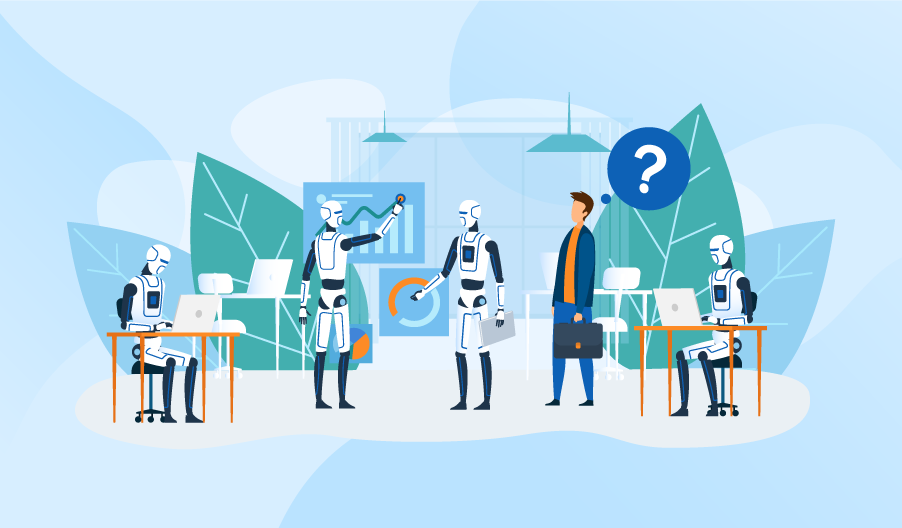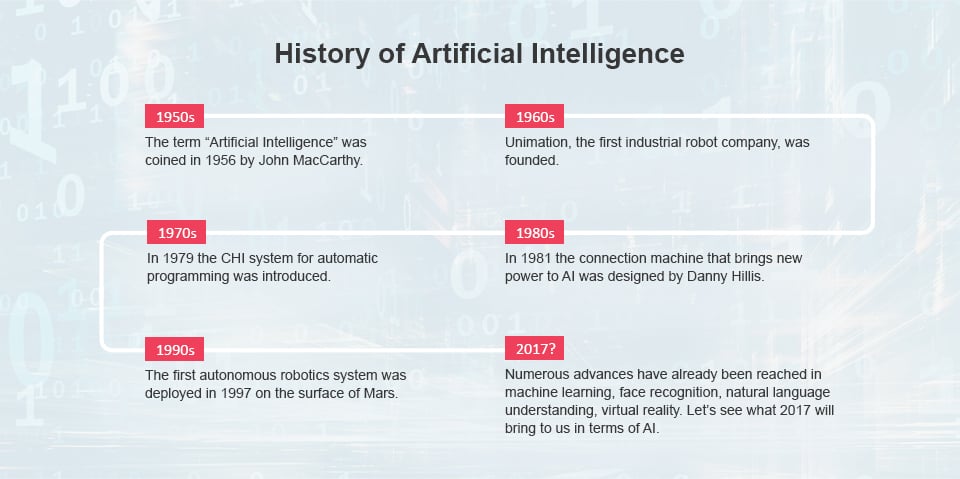The Biggest Fear about Artificial Intelligence: Will Robots Steal Our Jobs?
Though Artificial Intelligence (AI) is still in its infancy, there are already numerous discussions regarding its impact on the workplace. Indeed, as it always happens with the introduction of new concepts, some people seem to be rather cautious about incorporating AI into their lives.

Are there any risks?
Okay, AI is no longer a fiction. Should we then be afraid of robots replacing humans? Only if we are watching a blockbuster movie.
The major fear commonly associated with AI is the possibility that robots will take peoples’ jobs. Partially, it is true and people who complete routine and repetitive tasks at their jobs are at the highest risk. Advances in robotics allow machines do monotonous work faster and more accurately. Machines may also do multitasking or some risky tasks. Such capabilities will undoubtedly result in the displacement of certain jobs. At the same time, we should be aware that the major goal of robotics and machine learning is to eliminate monotonous tasks and facilitate peoples’ lives. The same way people were suspicious about the Industrial Revolution that occurred between the 17-th and the 18-th century. One of its major aims was to reduce manual work. However, it didn’t leave people without work. On the contrary, technological advances and the increased number of factories led to the appearance of new jobs, as well as the speed up of the production.
It has become appallingly obvious that our technology has exceeded our humanity.
Albert Einstein
New opportunities
Changes in the relationship between humans and machines at the workplace are inevitable. However, it does not necessarily mean that millions of humans will be left unemployed. The elimination of routine tasks should contribute to the creation of new ones.
As it happens with any machine, robots will need new updates and fixes. It will lead to new jobs and opportunities for technically skilled people. Indeed, no matter how clever the machine is, there is always a human who stands behind it. Accordingly, people shouldn’t be afraid of becoming jobless. They will simply move into new roles.
Besides, we should understand that even the smartest machines won’t be able to possess such qualities as creativity or emotional intelligence. Imagine you are dining in a restaurant where robots perform the functions of waiters, and you are not sure what to order. The robot will have no problems with giving you a detailed description of each dish. However, will it be able to give you some advice based on your current mood, or simply share a funny story? Hardly.
How to adjust
In any case, technological advances will bring visible changes in our workflow. We can spend months and years guessing how our lives will change. The truth is that probably no one actually knows how. Therefore, instead of dwelling on whether or not robots will take our jobs, it is better to think about the ways to adjust to these changes and use them to advantage.
There is no doubt that division of labor will be transformed drastically, and companies should be prepared for it. They should allocate tasks wisely, being able to identify quickly what tasks suit humans and what they should give to robots. To make collaboration between humans and machines more effective, business leaders should organize sufficient training of their staff.
Since robots will be able to perform routine or complex tasks, business leaders may place their focus on business development. They should dedicate more time to the development of interpersonal communication and problem-solving within their organization.
In total, we should not be afraid of exploring AI. We should learn how to use it, applying different approaches and learning from these experiences. When incorporating AI into our lives, we might make some mistakes, and we will certainly do so. However, it is always better to try and make a mistake, rather than do nothing. Since there are no maps or guides how to do it right, the best option we may choose is to start experimenting.

Benefits we already have
AI has already brought numerous benefits into our lives. Voice-recognition systems, driverless cars – could we think about such advancements at least ten years ago?
Modern technologies allow business owners monitor their staff in a better way. Managers already take advantages of time and task tracking tools, being able to identify whether their employees allocate time wisely and whether they complete their tasks on time. GPS tracking systems are applied in logistics and other sectors, enabling companies to monitor driver location, fuel consumption, etc.
It is in human nature to be afraid of anything that is new and unknown. However, if people did not experiment and take risks in the past, would we be able to enjoy such (common and usual) conveniences as the Internet or even electricity? I don’t think so. In the end, we only regret the chances we didn’t take. Who knows, maybe we are now at the edge of something incredibly great and important.

